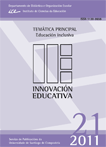La investigación formativa a través del aprendizaje orientado a proyectos: una propuesta de innovación en el Grado de Pedagogía
Contido principal do artigo
Resumo
La investigación formativa sitúa al alumnado como protagonista activo de su propio proceso de aprendizaje. El rol del profesorado es acompañar a los estudiantes hacia el aprendizaje independiente, motivándolos a trabajar de forma autónoma. El alumnado adopta un rol activo, trabaja en equipo, busca información, y planifica el trabajo, tomando sus propias decisiones, integrando conocimientos, y desarrollando competencias diversas. En esta innovación apostamos por el aprendizaje orientado a proyectos (ABP) y la evaluación con portafolio digital, como estrategias para la investigación formativa.
La finalidad del estudio que presentamos es el análisis de la innovación en una asignatura del grado de Pedagogía, desde la perspectiva del alumnado participante; mediante el método por encuesta, orientada al estudio de caso.
Los principales resultados obtenidos evidencian la idoneidad de la innovación docente implementada para potenciar el desarrollo de habilidades de pensamiento de orden superior. El ABP favorece la adquisición e integración de los nuevos conocimientos, destacamos especialmente, el desarrollo de dos competencias básicas como son el trabajo colaborativo y la capacidad de reflexión. Para el desarrollo de estas competencias, han resultado especialmente útiles, según el alumnado, las actividades de aprendizaje autónomo, las actividades colaborativas, las del proyecto de investigación y el portafolio. El aspecto con el que el alumnado se siente más satisfecho es el nivel de autonomía alcanzado tras cursar la asignatura. Este resultado evidencia los beneficios de la metodología docente no directiva, donde el alumnado adopta un rol activo y el profesorado ofrece feed back, guía el proceso de aprendizaje y evalúa.
Por todo concluimos que alentar el aprendizaje a través de proyectos está demostrando efectos positivos en el fomento de la investigación, en la medida que el alumnado se involucra en un proceso dinámico e interactivo de aprendizaje.
http://dx.doi.org/10.15304/ie.24.1586
Palavras-chave:
Detalles do artigo
Artigos mais lidos pelo mesmo (s) autor (es)
- Trinidad Donoso Vázquez, María José Rubio Hurtado, Ruth Vilà Baños, Los espectadores y espectadoras de la ciberviolencia de género , Innovación educativa: n. 27 (2017): Conflito e convivencia na escola






